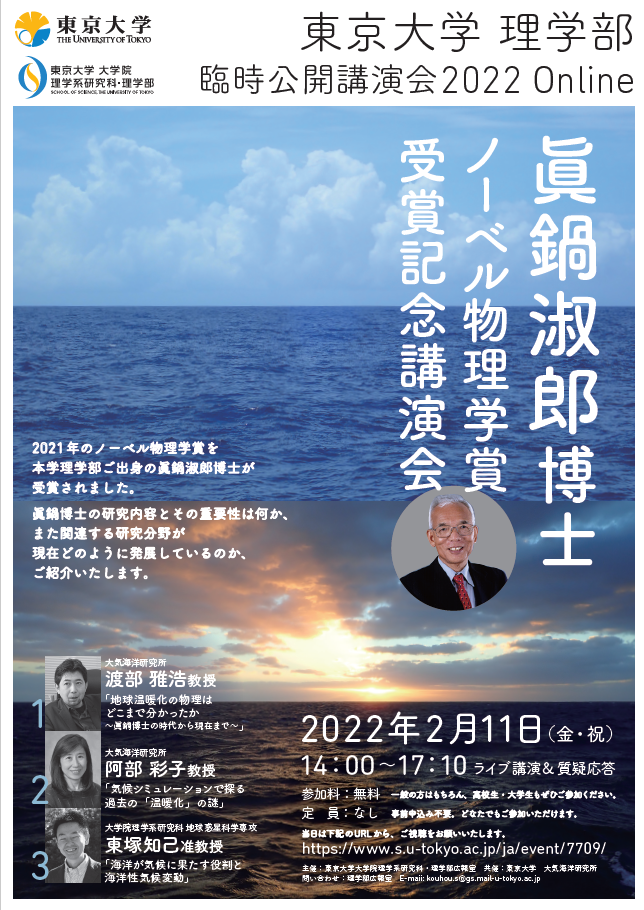DATE2022.01.19 #Events
Disclaimer: machine translated by DeepL which may contain errors.
Dr. Yoshiro Manabe Nobel Prize in Physics
Commemorative Lecture
Dr. Yoshiro Manabe, a graduate of our Faculty of Science, has been awarded the Nobel Prize in Physics for the year 2021.
Dr. Manabe will introduce his research, its importance, and how related research fields are currently developing.
Thank you very much for the many questionnaires we received from the audience on the day of the presentation.
The slide presentation (PDF) of the day can be downloaded from the link below. The slide presentation is no longer available.
- Masahiro Watanabe (Professor, Atmosphere and Ocean Research Institute)
- Ayako Abe (Professor, Atmosphere and Ocean Research Institute)
- Tomomi Higashizuka (Associate Professor, Department of Earth and Planetary Science)
(Video of this lecture will be available on the Graduate School of Science and Faculty of Science YouTube channel after the event.)
Greetings
Professor Masahiro Hoshino, Dean, Graduate School of Science
Introduction of Dr. Manabe's research achievements Professor Kaoru Sato, Department of Earth and Planetary Science
Video message from Dr. Yoshiro Manabe
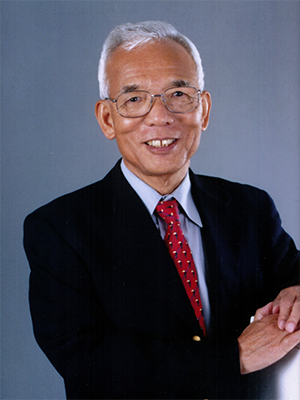
Speakers and Lectures
How Much Do We Know about the Physics of Global Warming: From Dr. Manabe's Time to the Present
Masahiro Watanabe, Professor, Atmosphere and Ocean Research Institute
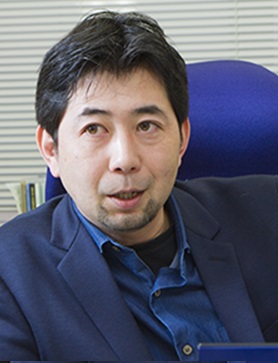
The natural scientific understanding of global warming has advanced significantly over the past 30 years. The major parts of this understanding are summarized in the IPCC Assessment Reports, but the driving force that has facilitated the understanding has been the various studies conducted by climate scientists around the world. Dr. Manabe's seminal work in 1D radiative-convective equilibrium and early coupled atmosphere-ocean model development and its application to the warming response is at the origin of these studies. In this lecture, Dr. Manabe will introduce the current state of climate modeling and the findings on the mechanism of global warming as summarized in the latest IPCC report, while referring to his achievements. Then, I would like to discuss the future direction of global warming research with you.
Mystery of Past "Global Warming" Explored by Climate Simulation
Ayako Abe (Professor, Atmosphere and Ocean Research Institute)
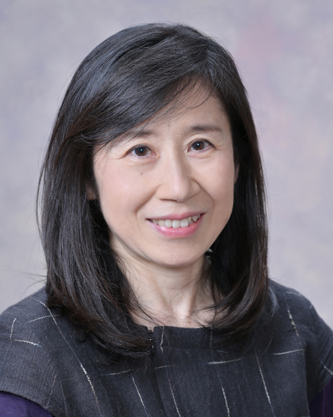
How did past warming in Earth's history occur? During the last million years of human evolution, glacial-interglacial cycles with expansion and contraction of ice sheets in North America and Europe were repeated with a cycle of about 100,000 years, and in particular, rapid warming, deglaciation, and sea-level rise occurred from glacial to interglacial cycles. Climate indices around the world, such as air temperature, sea surface temperature, dryness/humidity, and deep ocean circulation, also changed. Whether these changes are due to astronomical factors (Earth's orbital elements) or atmospheric carbon dioxide concentrations has actually been a major controversy for a long time. This lecture will review the fundamentals of climatology and the development of climate models, and use the latest climate simulations to explore the mysteries of catastrophic changes in the climate system on a scale of thousands to tens of thousands of years.
The Role of Oceans in Climate and Oceanic Climate Change
Tomoki Higashizuka, Associate Professor, Department of Earth and Planetary Science
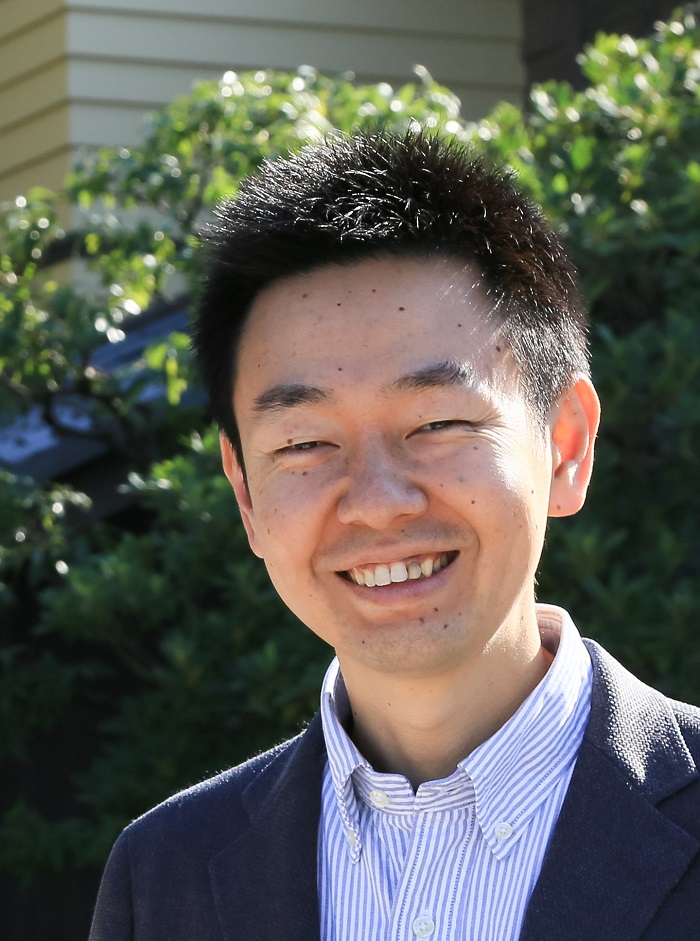
The oceans play an important role in the Earth's climate due to their large thermal inertia (i.e., they do not warm up or cool down easily). Therefore, a realistic reproduction of the oceans is essential for climate models to reproduce the Earth's climate. In the first half of this talk, I will review the development of ocean models, part of the climate models developed under Dr. Manabe's leadership, and discuss the importance of the oceans in climate, with a particular focus on the role they play in global warming. In the second half of this talk, I will introduce oceanic climate change phenomena represented by the El Niño phenomenon and its long-term modulation with global warming, touching on the latest research using climate models.
Video messages from alumni associated with Dr. Manabe
Emeritus Professor Taro Matsuno and Toshio Yamagata, The University of Tokyo,
Naoyuki Hasegawa, Director General, Japan Meteorological Agency, and Noboru Nakamura, Professor, University of Chicago
Greetings
Professor Eiichi Tajika, Head of Department of Earth and Planetary Science
Date
February 11, 2022 (Friday, national holiday) Lecture has ended, thank you for watching.
Time
14:00-17:10
*Live lecture and Q&A session (using Slido ) will be held from Koshiba Hall, Faculty of Science Bldg. 1.
Please click here to watch the lecture on the day of the event.
YouTube Graduate School of Science, School of Science channel
Admission
Free (No advance registration required. Anyone is welcome to attend.)
Capacity
None (High school and university students as well as the general public are welcome to attend)
Delivery
- A question-and-answer session will be held after each presentation using Slido on the day of the event. Please enter the access code provided on the web page of Slido to participate in the session.
- A recording of the live lectures will be made available at a later date. If you would like to listen to the lecture again, or if you missed the live lecture, please visit the Faculty of Science's YouTube channel. Please "subscribe" and enjoy!
Hosted by
Graduate School of Science, The University of Tokyo
Co-organized by
Atmosphere and Ocean Research Institute, The University of Tokyo
Contact
Public Relations Office, Graduate School of Science, The University of Tokyo
| TEL | 03-5841-7585 |
|---|---|
| kouhou.s@gs.mail.u-tokyo.ac.jp |



